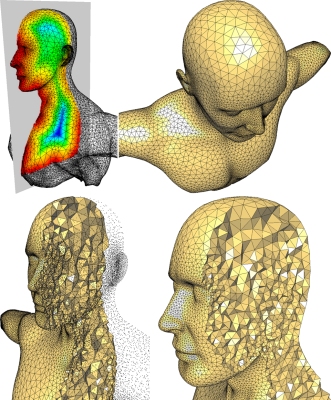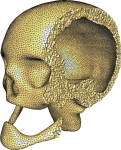
Pierre Alliez, David Cohen-Steiner, Mariette Yvinec and Mathieu Desbrun
Bibtex
Slides [ppt, 18 Mbytes] [pdf, 13 Mbytes]
To appear at SIGGRAPH 2005
Abstract: In this paper, a novel Delaunay-based variational approach to isotropic tetrahedral meshing is presented. To achieve both robustness and efficiency, we minimize a simple mesh-dependent energy through global updates of both vertex positions and connectivity. As this energy is known to be the L1 distance between an isotropic quadratic function and its linear interpolation on the mesh, our minimization procedure generates well-shaped tetrahedra. Mesh design is controlled through a gradation smoothness parameter and selection of the desired number of vertices. We provide the foundations of our approach by explaining both the underlying variational principle and its geometric interpretation. We demonstrate the quality of the resulting meshes through a series of examples.
Another recent work on the same topic to appear at International Meshing Roundtable.
